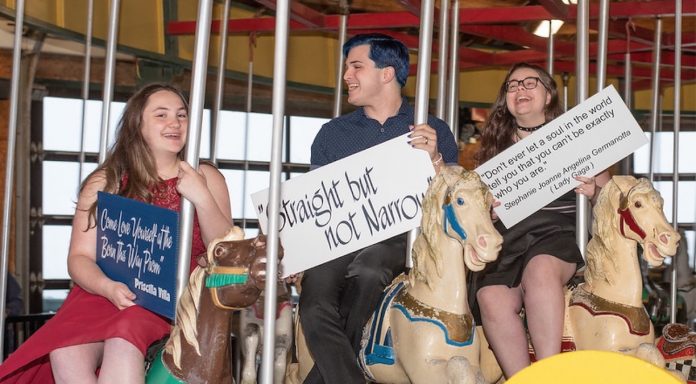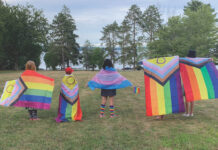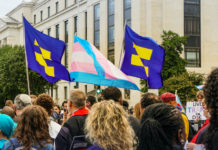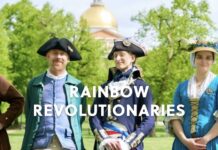[This article appears in the July/August 2020 issue of Boston Spirit magazine. Subscribe for free today.]
For many LGBTQ adults, the very idea of being able to participate in the rite of passage of a prom is hard to even imagine. Unfortunately, all of southern New England’s local alternative proms—special events created just for youth to celebrate, dance and make memories of their own—suffered the same fate as everything else around the world this spring; they were all cancelled. This sad fact was especially hard on some of the youth, for whom the prom is one of their only chances to be with other LGBTQ youth. In that spirit, let’s celebrate the queer proms of New England, knowing that they will return.
Born This Way
In Rhode Island, the Born This Way Prom was about to start its second decade throwing a grand evening. Taking place for most of that time at the spectacular Rotunda Ballroom at Easton’s Beach in Newport, some 250 LGBTQ teens and young adults from 35 high schools in Massachusetts and Rhode Island attend each year. The event is sponsored by the Unitarian-Universalist Channing Memorial Church in Newport, and numerous community members outside the congregation volunteer as well. Some of them help with food and drink or just act as chaperones, dancing with the young attendees, giving them a chance to feel a level of acceptance that is often rare.
The prom’s origins lie with Lee Whitaker, a trans man and the founder of Interweave, a group connected with Channing for LGBTQ people and allies, focused on education, support and advocacy. “I was talking with some Interweave folks along with our pastor at the time, and we started talking about proms,” said Whitaker. “I never went to my prom, and I know a lot of queer people who never went to theirs because they did not feel comfortable or safe. It didn’t take too much convincing to get the other Interweave members on board to put on a prom. I like to believe that each person who attends the prom is celebrated and shown unconditional love for who they are.”
“The young people have so much fun,” added Rex LeBeau, a nonbinary person and a leader at Interweave. “Older queer adults who attend often burst into tears at how much joy fills the room, thinking how different their lives would have been if they had an event like this when they were young.”
A highlight of the Born This Way Prom is the historic carousel, housed within the building, where attendees can hop on a sparkly pony for rides and photos with friends. And there’s the annual crowning of the prom king and queen. Perhaps the ultimate highlight of the event is the presence of the many drag queens who turn out in their heels and gowns to perform and dance with the crowd.
As for safety concerns, Sean O’Connor of Newport Out said, “There have never been any issues. We hire two Newport special detail officers—it’s required by the venue. One of them would bring her girlfriend when they were at Salve Regina University—they are now married. Many parents have told us that our prom is nothing like the local high school proms of today. Our kids are so happy to be there and always are a joy to behold.”
New Kids on the Block
In Woburn, the GSA Prom—called the Community Gala—was held for the first time in 2019. Under the guidance of Rosemary Donovan, a coordinator for the district’s school guidance departments and then-GSA advisor, Woburn Memorial High School started the process of reaching out to other GSAs during the spring of 2018. During the fall of 2019, teacher and current GSA advisor Gretchen Pollard-Ramos became involved with the planning.
The dance was held in March, so it did not conflict with any other prom. Although the dance was considered formal/semi-formal, students were encouraged to dress as they felt most comfortable. Important special touches included a queer DJ and a full dinner. This year, a drag performance had been planned, featuring Sister Sandra Music of the Boston Sisters of Perpetual Indulgence.
The 2019 school-sponsored event was attended by the superintendent of Woburn Schools as well as school committee members, the Woburn Memorial principal and all of the assistant principals, along with many staff people from 11 schools. The school resource officer attended in his dress blues.
“It was a night to remember and an honor to be in the presence of 130 LBGTQ youth and their straight allies,” said Pollard-Ramos. “We witnessed new friendships, tears of joy, carefree dancing, freedom of expression and a community supporting its youth. Events like this can be life-changing, but more importantly, life-saving.”
“The Community Gala was an amazing event that promoted inclusivity and acceptance,” added Jessica Callanan, the principal at Woburn Memorial High School. “I witnessed over 10 communities coming together to support students in their journey to be their real selves. I feel so fortunate to have been a part of the first gala and what I know will be a long-lasting tradition for WMHS.”
Peabody Veterans Memorial High School GSA member Yefry Ortiz agrees. “The GSA dance was an amazing experience. The thought of being able to be yourself in a public space without being judged for it is everything people like me want.”
Fellow Peabody GSA member Levi Duval, weighed in enthusiastically, “The dance was surreal, so many people who thought they were an outcast, or different, came together. I left with new friends and amazing memories. It’s a night worth remembering. I felt safe and welcomed, and like I didn’t have to worry about what others thought. We were all alike and happy.”
For the 2020 dance, 17 high schools—representing Burlington, Lowell, Stoneham, Peabody and others—were slated to attend, and planners expected more than 200 students. The community stepped up with grants from The Boston Pride Organization, Boston Sisters of Perpetual Indul-gence, the NEA LGBTQ Caucus and individual donors.
In the end, the group was faced, as were they all, with the specter of the COVID-19 virus and cancelled. However, they are excited and ready to hold the dance when it is deemed safe to do so, perhaps as a fall harvest dance.
First Prom
Then there is the BAGLY (Boston Alliance of LGBTQ+ Youth) Prom, the first-ever LGBTQ youth prom in the world. It was begun in 1980 by a high school senior named Michael who was lamenting not being able to go to the prom with his same-sex date. This was right before the AIDS epidemic, a very different time, as BAGLY Executive Director Grace Sterling Stowell explains. “Everything about the LGBTQ community was underground then,” she said, “focused on the bars and clubs.”
Being a youth-led organization, BAGLY enthusiastically backed Michael’s dream of a prom for queer youth, helping him in launching it in June 1981. Held in the basement of Boston’s Arlington Street Church, it had humble beginnings—there was no model for such an undertaking. “I don’t even know how many youth showed up that night, said Stowell, “maybe 75. We had no money. There was pot luck food, and the youth dressed up as best they could. Music came from someone’s boom box—it was very grassroots.”
BAGLY’s prom has been held every year since, with the exception of this year, which would have been their 40th anniversary. It grew exponentially in the late1980s, when fundraising efforts were becoming more successful, and there was more general concern about LGBTQ youth within the larger community.
In 1995, the Massachusetts Governor’s Commission on LGBTQ Youth created Youth Pride, a march and rally modeled on the Boston Pride Festival, which BAGLY had participated in over the years. The next year, BAGLY moved their prom to the night of Youth Pride. This meant that the youth coming from all over the state to join in the celebration and march in the parade could then attend the prom. The expansion in sheer numbers of attendees necessitated a move out of the church basement and into Boston City Hall. “That was especially significant,” said Stowell, “that the youth recognized they had the support of the mayor.” That year saw 200 attendees, with the numbers growing steadily every year after that. To accommodate the larger number of attendees, they needed more adult volunteers—folks from the other LGBTQ organizations, adult advisors from BAGLY, teachers and other friends of the organization. By 1999 there were 1000 or more youth coming to the prom, and the numbers jumped even higher than that.
As the years went on, City Hall became less and less viable—it was becoming very expensive, and they were spending more and more on security—owing to the heightened concerns post-9/11—so the event was moved out of City Hall and under an outdoor tent.
Fast-forward to 2020. The plan was to create an extraordinary event to celebrate 40 years of proms. “We had a special venue lined up,” said Stowell, “and we were going to hold it on a different day, to give the youth a chance to dress up more than they had been able to in the past, when they would have been marching all day. We envisioned a very special occasion, complete with catering and more.”
The decision to cancel the event has been a collective loss, said Stowell. “We held a virtual version of Youth Pride for a week this year, with great programming every day, but I am saddened for this group of young people, many of whom are graduating and have missed their last chance to attend a prom. And now, with the epidemic of racial violence, it is especially difficult not to have a way to gather beyond the virtual methods.”
Stowell has been to every prom herself, and has had countless wonderful experiences. “From a young person coming for the first time, having their first chance to express themselves as they choose, bringing a date—it’s a real thrill to see young people having the opportunity to attend a prom, have a prom picture taken, and so many of the other things you would expect to see at any prom, but in a safe, affirming environment.”
Not a subscriber? Sign up today for a free subscription to Boston Spirit magazine, New England’s premier LGBT magazine. We will send you a copy of Boston Spirit 6 times per year and we never sell/rent our subscriber information. Click HERE to sign up!









